Iran says it has received proposal for next round of US talks
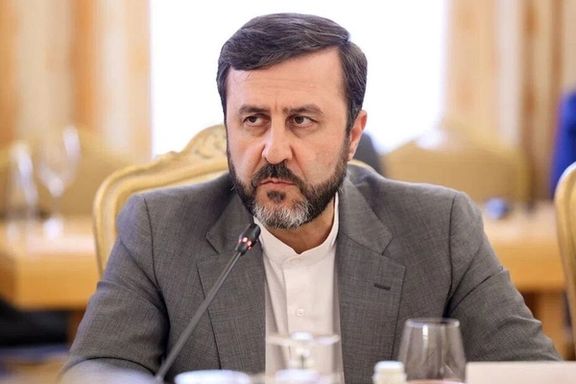
Iran has received a proposal for the next round of indirect negotiations with the United States, deputy foreign minister Kazem Gharibabadi said on Tuesday.

Iran has received a proposal for the next round of indirect negotiations with the United States, deputy foreign minister Kazem Gharibabadi said on Tuesday.
“We have received a proposal regarding the next round of indirect talks between Iran and the US, and it is under review,” Gharibabadi, who serves as deputy for legal and international affairs, said in remarks published by the state media.
No further details about the content or timing of the proposed negotiations have been released.
The comments come a day after a Wall Street Journal reporter said that the next round of Iran-US nuclear talks is expected to take place this weekend in Rome.
However, citing an Iranian official, the United Arab Emirates' based The National reported that Iran has "not accepted" Oman's invitation for a fifth round of talks with the US.
It said that American officials' insistence on "zero enrichment" has left officials in Iran uncertain about the usefulness of more talks.
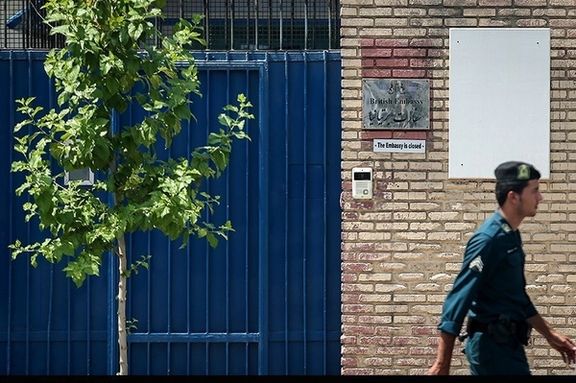
As European powers are in tense talks with Iran over whether to impose punishing sanctions over its nuclear program, terrorism-related arrests of Iranians on UK soil and a drama over detained Britons are pushing London-Tehran ties to new lows.
The European Union and the UK on Monday expressed deep concern over Iran’s expanding nuclear program and what they called its destabilizing activities and hostage diplomacy in a joint statement.
Tensions between Tehran and London have ratcheted up sharply in recent weeks, likely sharpening the collective European tack on Iran.
"Let me be clear, we will not tolerate growing state backed threats on UK soil. The Iranian regime poses an unacceptable threat to our domestic security which cannot continue," British interior minister Yvette Cooper told parliament on Monday.
Iran’s Foreign Ministry on Sunday summoned the UK’s chargé d'affaires in Tehran to protest the arrest of several Iranian nationals in the UK in connection with alleged spying and terror-related activities. On Monday, Iran's ambassador to London Ali Mousavi was summoned in response.
British authorities charged three Iranian nationals under the National Security Act on Saturday for conducting surveillance against journalists from Iran International. Earlier this month, five other Iranian nationals were detained in a separate counter-terrorism operation.
The case has added urgency to ongoing debates in the UK Parliament over whether to designate Iran’s Islamic Revolutionary Guard Corps (IRGC) as a terrorist organization.
Over 550 members of the UK Parliament and peers have signed a letter urging the British government to move forward with the designation, reflecting growing bipartisan concern over Iran’s activities in the UK and abroad.
Tense meeting in Istanbul
The EU statement released on Monday came after a meeting of senior diplomats of the UK, France, and Germany –collectively known as the E3– with two Iranian deputy foreign ministers in Istanbul on May 16 to discuss the future of the 2015 nuclear agreement (JCPOA).
The three European powers are not directly involved in ongoing Tehran-Washington talks. However, they can trigger its snapback mechanism of the JCPOA before an October deadline and reimpose all UN sanctions on Iran should talks with Washington fail.
Quoting unnamed sources, Iran’s conservative Farhikhtegan newspaper reported on Sunday that the atmosphere of the meeting in Istanbul on May 16 was highly tense, with the European side allegedly issuing serious threats to impose additional sanctions on Iran—potentially exceeding the scope of UN sanctions—if Tehran fails to comply with future agreements.
The European side, the report claimed, also demanded that any potential Tehran-Washington deal include a clause— which it referred to as “snapback-plus”—that would allow the E3 to reimpose UN sanctions in the future if Iran violated the JCPOA.
Broader grievances, distrust
Beyond the nuclear file, the E3 has cited a wide range of concerns in their dealings with Tehran: Iran’s ballistic missile program, its support for Russia in the Ukraine conflict, threats to European national security, ongoing human rights violations, and the detention of European nationals.
Iran charged a British couple on a road trip in the country with espionage in February, drawing London's ire. France too is irate at Iran's detention of two French citizens for three years, deepening collective European mistrust with Tehran.
For its part, Iran accuses the E3 of failing to uphold their economic commitments under the JCPOA following the US withdrawal. Iranian officials argue that European governments and companies yielded to American pressure, rendering the promised sanctions relief largely ineffective.
Tehran also accuses the E3 of aligning too closely with US and Israeli positions on regional security issues.
Iranian foreign minister hot and cold
Despite the strained atmosphere, Iranian Foreign Minister Abbas Araghchi has continued to espouse a conciliatory tone in public statements towards the remaining Western signatories of the JCPOA, from which the United States unilaterally withdrew in 2018.
“Iran is ready, should it see genuine will and an independent approach from the European side (parties to the 2015 nuclear deal), to begin a new chapter in its relations with Europe,” he told a diplomatic forum in Tehran on May 18.
Nonetheless, Araghchi has issued a stern warning cautioning that any move by the E3 to trigger the snapback mechanism could mark not only the end of Europe’s role in the nuclear agreement but also push Iran toward more drastic measures.
Iranian officials have threatened withdrawal from the Nuclear Non-Proliferation Treaty (NPT) if talks with the US fail and sanctions remain.
Adding to the diplomatic strain, the E3 have so far not responded to Araghchi’s April 24 proposal to visit London, Paris, and Berlin and offer to engage in direct talks on the nuclear deal and other mutual concerns.
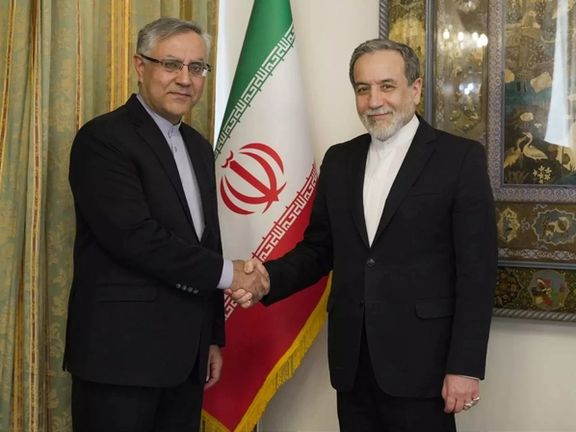
The United Kingdom summoned Iran’s ambassador Ali Mousavi on Monday after three Iranian nationals were charged with offences under the National Security Act, a spokesperson for the Foreign, Commonwealth and Development Office (FCDO) said.
"The UK Government is clear that protecting national security remains our top priority and Iran must be held accountable for its actions," the FCDO spokesperson said in a statement.
"The summons follows this weekend’s announcement which stated that three Iranian nationals had been charged with engaging in conduct likely to assist a foreign intelligence service," the statement added.
In two separate operations on May 3, eight men including seven Iranians were arrested by the British counter-terrorism police.
On Saturday, British counter-terrorism police charged three Iranian nationals with offences under the National Security Act, alleging they acted on behalf of Iran’s intelligence service and carried out surveillance targeting Iran International journalists.
The men — Mostafa Sepahvand, 39, Farhad Javadi Manesh, 44, and Shapoor Qalehali Khani Noori, 56 — were arrested at their homes in London on May 3 and charged on Friday.
All three are accused of engaging in conduct likely to assist a foreign intelligence service between August 14, 2024 and February 16, 2025, in breach of Section 3 of the National Security Act 2023.
In response, Iran's foreign ministry on Sunday summoned the UK chargé d'affaires in Tehran in protest over what it called the "unlawful and baseless" arrest of several Iranian nationals in the United Kingdom in two separate anti-terror operations.
Earlier on Monday, Iranian foreign ministry spokesman Esmail Baghaei said all signs of arbitrary detention were evident in the UK’s handling of the case.
“In the UK, as in other European countries, there is a pattern of imitation. All elements of arbitrary detention are present in the arrest of Iranian nationals in the UK. It is still unclear what charges they were arrested on,” he said.
Baghaei added that three individuals remain in custody while others have been released without clear explanation of the accusations. “The very notion of ‘connection with the Iranian government’ is vague, because a citizen must have contact with their own government for consular matters,” he said.
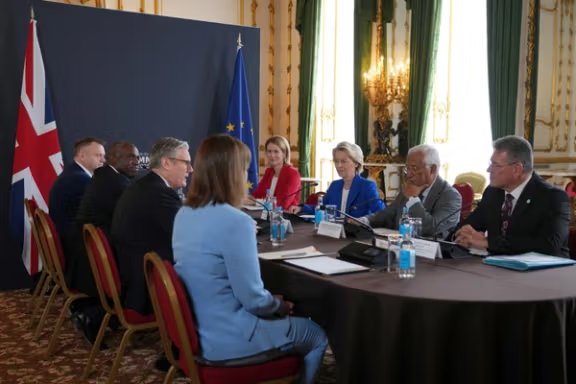
The European Union and the United Kingdom on Monday voiced deep concern over Iran’s expanding nuclear program and its continued imprisonment of foreign nationals, according to a joint statement issued after high-level talks.
“We continue to be deeply concerned by the dangerous expansion of Iran’s nuclear program, alongside its behavior in the region and on European soil,” the statement read.
The EU and UK also condemned what they described as Iran’s use of “hostage diplomacy,” calling for an immediate end to the detention of foreign nationals under politically motivated charges.
"We condemn Iran’s unjust detention of foreign nationals and call on Iran to halt its practice of hostage diplomacy," read the statement.
In January the European Parliament adopted a motion for a resolution condemning Iran’s detention of European Union citizens, labelling the practice as “hostage diplomacy" accusing Iran of using the prisoners for political ends.
Despite mounting tensions, both sides reaffirmed their commitment to securing a negotiated resolution to Iran’s nuclear issue and maintaining regional stability.
The joint statement also expressed support for political progress in Syria and Lebanon, backing efforts toward peace, stability, and reform in both countries.
The remarks come amid stalled nuclear diplomacy and rising concern among Western powers about Iran’s growing stockpile of enriched uranium and regional influence through proxy groups.

Iran on Monday criticized the United States for what it called inconsistent and hostile conduct in the ongoing nuclear talks, rejecting Washington’s demand for zero uranium enrichment ahead of a possible new round of negotiations mediated by Oman.
Speaking at a press briefing in Tehran, Iranian Foreign Ministry spokesman Esmail Bagahei said, “The difficulty of negotiating with the US lies in the fact that you are dealing with a party that respects none of the established norms of a diplomatic process.”
“The very act of imposing sanctions while claiming to pursue diplomacy with the Islamic Republic of Iran shows a lack of seriousness and goodwill,” he added, warning that Washington’s shifting positions undermined trust.
“The Americans’ shifting position on enrichment is like a game of snakes and ladders—just as we make progress, the US adopts a different stance,” Bagahei said, referring to recent comments by US nuclear envoy Steve Witkoff that Washington would not accept any level of uranium enrichment in a future agreement.
Bagahei stressed that Iran’s enrichment program was “non-negotiable,” calling it both a legal right under the Non-Proliferation Treaty (NPT) and a national achievement.
“Uranium enrichment is not some kind of fantasy that we can simply suspend or stop. It is a technology and a necessity to ensure the uninterrupted functioning of Iran’s nuclear industry,” he said. “We cannot give it up.”
Iranian Foreign Minister Abbas Araghchi also dismissed Witkoff’s remarks, saying they were “completely at a distance from the reality of the negotiations.”
In a post on X on Sunday, Araghchi wrote: “If the US is interested in ensuring that Iran will not have nuclear weapons, a deal is within reach, and we are ready for a serious conversation to achieve a solution that will forever ensure that outcome. Enrichment in Iran, however, will continue with or without a deal.”
He accused the US of contradictory messaging. “Iran can only control what we Iranians do, and that is to avoid negotiating in public—particularly given the current dissonance we are seeing between what our US interlocutors say in public and in private, and from one week to the other,” Araghchi said.
Next round of talks expected soon
Elsewhere in his press conference, Baghaei said the date and location for the next round of indirect US-Iran nuclear talks have not been set. Araghchi, however, said on Sunday that the date is set and will soon be announced by Oman, which is mediating.
Baghaei denied reports of parallel negotiations between other Iranian and US officials, specifically between Ali Shamkhani – Iran's former top security official and currently an advisor to the Supreme Leader -- and US Secretary of State Marco Rubio.
“There are no parallel negotiations. The only negotiation process that exists is this indirect one, led by the Iranian foreign minister and the US president’s special envoy,” Bagahei said.
The US and Iran have held four previous rounds of talks in Muscat and Rome. Witkoff said on Sunday that the next round could take place in Europe later this week.
President Donald Trump said Thursday the US was “very close” to a deal but issued a warning on Friday. “They have a proposal. More importantly, they know they have to move quickly or something bad—something bad’s going to happen,” he told reporters aboard Air Force One.
Baghaei said on Monday, “We have not received any written proposal from the United States, and their verbal offers constantly shift,” echoing remarks made by Foreign Minister Abbas Araghchi the previous day.
Iran to respond if E3 triggers snapback
Iran’s foreign ministry spokesman also warned on Monday that Tehran will respond to any hostile action, including a possible move by European countries to trigger the snapback mechanism—a process that would automatically reimpose UN sanctions on Iran under the 2015 nuclear deal.
“We will not leave any hostile action without a response,” Baghaei said. “There is no legal basis for activating the snapback mechanism, and the insistence of some European countries on doing so is baseless.”
“If the Europeans use the snapback mechanism, we will definitely take measures in response,” he added.
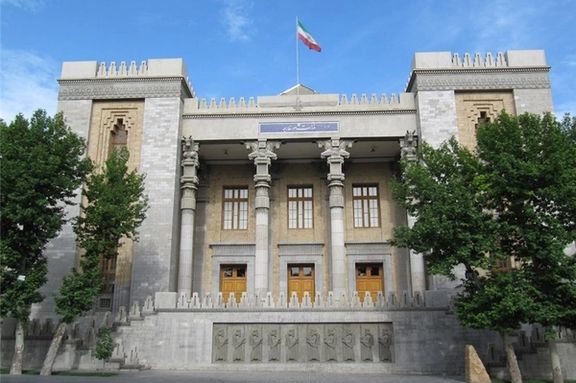
Iran's foreign ministry on Sunday summoned the UK chargé d'affaires in Tehran in protest over what it called the "unlawful and baseless" arrest of several Iranian nationals in the United Kingdom in two separate anti-terror operations.
In the absence of the British ambassador, the UK diplomat was summoned by Shahram Ghazizadeh, director of the Iranian Foreign Ministry’s Western Europe Department, who conveyed Tehran's strong objections to both the arrests and what he described as unfounded accusations against the Islamic Republic.
Ghazizadeh demanded explanations from the UK government regarding the legal grounds for detaining the individuals, according to a Foreign Ministry statement.
In two separate operations on May 3, eight men including seven Iranians were arrested by the British counter-terrorism police.
The Iranian Foreign Ministry official accused London of deliberately failing to notify the Iranian embassy in a timely manner and condemned what he described as Britain's refusal to provide evidence and its denial of consular access.
The Iranian official also warned that Britain would be held responsible for the consequences of actions that appeared politically motivated and aimed at pressuring Iran.
The UK police charged three of the Iranian detainees with offences under the National Security Act, alleging they acted on behalf of Iran’s intelligence service and carried out surveillance targeting Iran International journalists.
The men — Mostafa Sepahvand, 39, Farhad Javadi Manesh, 44, and Shapoor Qalehali Khani Noori, 56 — were arrested at their homes in London on May 3 and charged on Friday.
All three are accused of engaging in conduct likely to assist a foreign intelligence service between August 14, 2024 and February 16, 2025, in breach of Section 3 of the National Security Act 2023. The foreign state involved is Iran, police said.
The five other detainees who had been arrested as part of a "pre-planned" investigation into a suspected plot to "attack a specific location" were later released from custody.
The five men included four Iranians arrested in different parts of the UK under the Terrorism Act on suspicion of preparing a terror attack. The men, aged between 29 and 46, were arrested in Swindon, west London, Stockport, and Rochdale.
The fifth man, aged 24 and arrested in Manchester under the Police and Criminal Evidence Act, had previously been released on bail with conditions, pending a court date in May.